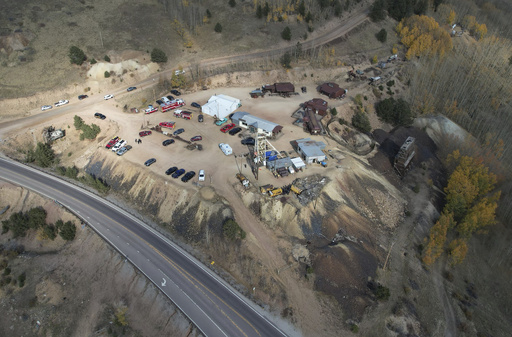Denver — Investigators are currently looking into the circumstances surrounding an elevator malfunction at a former gold mine in Colorado that tragically resulted in one death, four injuries, and left twelve others stranded for several hours deep underground. The incident occurred at the Mollie Kathleen Gold Mine, located near Cripple Creek, approximately 1,000 feet (305 meters) below the surface on Thursday. According to Teller County Sheriff Jason Mikesell, the elevator encountered issues while descending approximately 500 feet (152 meters) into the mine.
The deceased has been identified as Patrick Weier, a 46-year-old tour guide and father from Victor, a town nearby. Details regarding his death remain unclear; however, the sheriff confirmed it was related to the elevator’s mechanical failure, and not attributable to any health problems.
In addition to Weier, four others aboard the lift sustained minor injuries, such as back pain, neck discomfort, and arm pain. A total of twelve adults from a separate group were trapped underground for about six hours. Fortunately, these individuals had access to fresh water and were able to communicate with authorities via radios, who informed them of the elevator malfunction, Mikesell noted.
Steven Schafrik, an associate professor of mining engineering at the University of Kentucky, remarked on the rarity of elevator incidents in mining operations. He noted that elevators have served the mining industry since the mid-1800s, designed with fail-safe devices to prevent severe fall outcomes in cases of cable malfunctions. “They are incredibly safe,” Schafrik stated, although he refrained from commenting specifically on this Colorado event.
Sheriff Mikesell emphasized that the family operating the Mollie Kathleen Mine had a longstanding commitment to safety. “In a mining setting, particularly at depths like 1,000 feet, machinery can lead to accidents,” he cautioned.
Mines functioning as tourist attractions in Colorado are required to have inspectors review the sites and their operational systems daily, according to the state’s Division of Reclamation, Mining and Safety. Mikesell was unable to confirm when the last inspection of the Mollie Kathleen Mine occurred or whether inspection records were available online.
A significant update to the elevator system was made in 1988 when the mine changed ownership. The mine’s website indicates that a second lift designed for nine people was added beneath the primary elevator, along with a new motor to handle the increased load.
Local, state, and federal agencies, including the U.S. Mine Safety and Health Administration and the Occupational Safety and Health Administration, are concurrently investigating the incident. Engineers worked diligently on Thursday night to ensure the elevator was safe to operate again before retrieving the visitors, which included sending the empty elevator down to the bottom of the shaft and successfully bringing it back up.
The twelve visitors who were stranded were eventually lifted back to safety in groups of four over a span of thirty minutes, as per the sheriff’s office. They had been prepared for a rope rescue in case the elevator could not be fixed in time.
The incident was reported around noon during the closing week of operations for the Mollie Kathleen Gold Mine before its winter break, according to Sheriff Mikesell. The mine’s owners shared their condolences and expressed gratitude to emergency responders, announcing that the mine would be closed until further notice.
Cripple Creek is a small community with approximately 1,100 residents, located in the Rocky Mountains, southwest of Colorado Springs. The Mollie Kathleen Gold Mine initially opened in the 1800s, closing in 1961, but continues to offer tours. According to its website, tours typically last one hour, allowing visitors to see gold veins in the rock and ride an underground tram. Mollie Kathleen Gortner famously discovered the mine in 1891 upon spotting quartz laced with gold.


